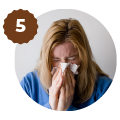Respiratory Illnesses
Respiratory illnesses spread through airborne particles. We can lessen the chances of contracting a respiratory illness by being aware of symptoms associated with it and getting vaccinated. Protect the FAMUly!
As part of FAMU's commitment to maintain a safe and healthy University environment, we are updating respiratory virus health guidance based on recent Centers for Disease Control and Prevention (CDC) recommendations. Respiratory viruses include flu, COVID- 19, and RSV.*
1. If You Get Sick:
Stay at home and away from others if you have respiratory virus symptoms that aren't better explained by another cause.
Symptoms can include the following:
| Fever | Chest Discomfort |
| Chills | Body aches |
| Fatigue | New loss of taste or smell |
| Cough | Vomiting |
| Runny nose | Weakness |
| Headache | Sore Throat |
2. Resumption of Activities:
You can go back to your normal activities when, for at least 24 hours:
- Your symptoms are getting better overall and you do not have a fever.
- If you have a fever, you must be fever-free for at least 24 hours without using a fever reducing medication.
3. Keep Safe:
When you resume normal activities, take added precautions for the next 5 days, including additional steps for cleaner air, hygiene, masks, physical distancing, and/or testing when you will be indoors around others. Contact your supervisor or team to inform them of your situation and discuss work arrangements.
*Please note that Measles precautions are not included in this guidance.
You can help prevent the spread of respiratory illness by washing your hands. Wash hands often for at least 20 seconds in warm, soapy water. It's simple, but so important!
6 Reasons Why Handwashing is Important in Preventing Illness & The Spread of Germs
 1. 33% of people don’t use soap when washing their hands.
1. 33% of people don’t use soap when washing their hands.  2. 80% of communicable diseases are transferred by touch.
2. 80% of communicable diseases are transferred by touch.  3. 20% of people wash their hands before preparing food.
3. 20% of people wash their hands before preparing food.  4. 39% of people wash their hands before eating food.
4. 39% of people wash their hands before eating food.  5. 50% of all foodborne illness outbreaks are a result of failing to wash hands correctly.
5. 50% of all foodborne illness outbreaks are a result of failing to wash hands correctly. 6. 22% of elevator buttons harbor more bacteria than toilet seats.
6. 22% of elevator buttons harbor more bacteria than toilet seats.
Promote healthy habits, wash your hands!
More information about Handwashing Awareness
Source: www.ccmhhealth.com/national-handwashing-awareness-week/
#HandwashingAwarenessMonth | @HealthNetwork




